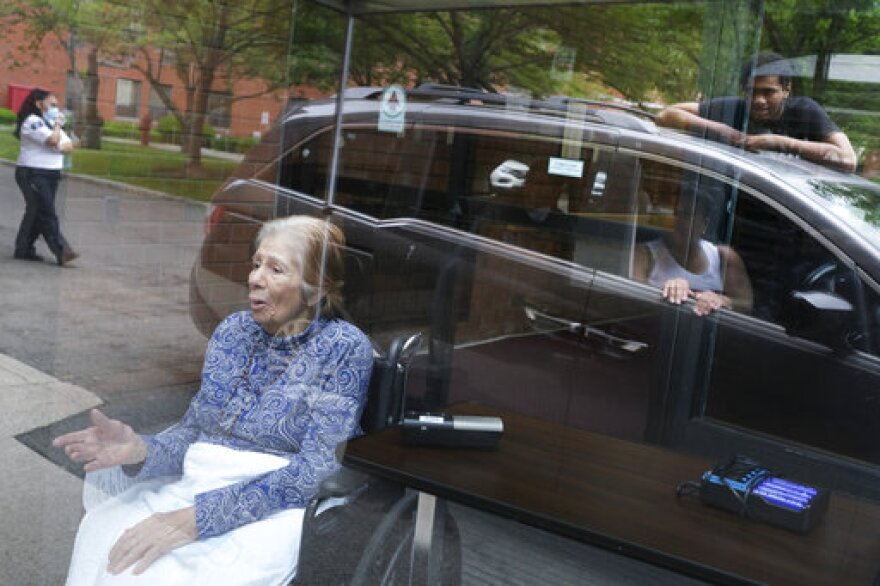ALBANY, NY (WSKG) - Family members of nursing home residents, testifying at a legislative hearing this week, told harrowing tales of neglect and unresponsive staff and administrators while the COVID-19 pandemic raged in New York this spring.
Virginia Wilson-Butler said her aunt Eva Johnson’s care in a Brooklyn nursing home was substandard even before the pandemic, with staff not available to feed her or change a soiled bed.
“Falling out of her wheelchair, feet entangled in the legs of the chair, and her sister -- my mother -- watching her lay on the floor,” Wilson Butler said. “My aunt confused, and my mother in tears.”
Wilson-Butler, who spoke at a joint Senate-Assembly hearing on how the state’s nursing homes handled the pandemic, said her aunt’s needs were addressed only after she and her mother intervened.
Wilson-Butler became a designated ombudsman for the nursing home, speaking out to help other residents, but even she was not allowed to enter the home after Gov. Andrew Cuomo banned all visitations in mid-March.
On April 21, her aunt, who had advanced dementia, developed pneumonia, and nursing home officials said she was presumed to have COVID-19. She died, alone, on May 4.
Mary Jo Botinardi’s father was in a Syracuse-area nursing home, also with dementia. The home told her on April 9 that two staff members and a resident had COVID-19, but there was nothing to worry about. Two hours later, a nurse called to say that her father had a fever of 102 and did not look well.
Botinardi said she asked for a coronavirus test for her father, but the nursing home told her that it was not necessary. After she called her county executive, he arranged a conference call with two social workers from the home. They maintained that the test was not needed.
“I heard it didn’t make a difference with his care,” Botinardi said. “And then I also heard them say, ‘We wouldn’t even know how to go about it.’ ”
That piqued the interest of Sen. Rachel May, the chair of the Committee on Aging.
“What do you think they meant by that?” May asked. “Did they mean they just didn’t know how to do the tests, or they didn’t have the tests?”
Botinardi answered that the home told her the two staff had been tested elsewhere, and the resident who tested positive received a test only because he was taken to a hospital after suffering a heart attack.
May asked Botinardi whether she thinks the lack of testing of residents was a deliberate strategy by the home.
“I absolutely feel that,” Botinardi said. “I felt like it was bad PR if they started testing patients. Because there were many.”
Jerry Montanaldo’s 81-year-old mother, Luis Maria, spoke only Spanish, and when her Hudson Valley nursing home was locked down in March, she could not communicate with staff without her family members being allowed to visit.
When she died on April 11, the facility listed her death as heart failure. But Montanaldo said his mother had symptoms of COVID-19, and he had to fight to get the death certificate changed to reflect that she likely died of the disease.
“However, since she was never officially tested for COVID at the facility, her death and the death of countless others like her during the height of the pandemic are still not included as part of the state’s official COVID-related death count,” Montanaldo said, “rendering her suffering, and her death, invisible.”
Montanaldo said the family was not told that the virus was in the nursing home until two weeks after residents first fell ill. He said the nursing home director blamed the state’s policy that began on March 25 and ended in mid-May that required homes to take back COVID-19 patients from hospitals. The Cuomo administration has denied that the policy led to more deaths.
Montanaldo said if his family had known about the positive cases in the homes, things might have been different.
“I would have pulled my mom out of that facility,” he said. “She would be alive today, actually, had we actually been informed about this policy change proactively.”
Montanaldo and others believe the thousands of deaths in nursing homes were a “preventable crisis” fueled by poor public policy discussions.
Wilson-Butler offered some suggestions for improving resident care, including posting cameras in rooms so that relatives can see their family member at all times.
“I can’t help my aunt anymore, rest in peace,” said Wilson-Butler. “But I can help someone else.”
Ultimately, the family members said, they don’t want the deaths of their loved ones to be in vain.


